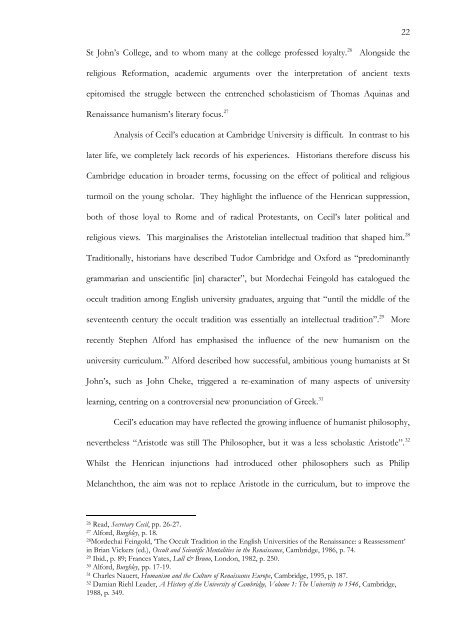The Alchemical Patronage of Sir William Cecil, Lord Burghley
The Alchemical Patronage of Sir William Cecil, Lord Burghley
The Alchemical Patronage of Sir William Cecil, Lord Burghley
Create successful ePaper yourself
Turn your PDF publications into a flip-book with our unique Google optimized e-Paper software.
St John‘s College, and to whom many at the college pr<strong>of</strong>essed loyalty. 26 Alongside the<br />
religious Reformation, academic arguments over the interpretation <strong>of</strong> ancient texts<br />
epitomised the struggle between the entrenched scholasticism <strong>of</strong> Thomas Aquinas and<br />
Renaissance humanism‘s literary focus. 27<br />
Analysis <strong>of</strong> <strong>Cecil</strong>‘s education at Cambridge University is difficult. In contrast to his<br />
later life, we completely lack records <strong>of</strong> his experiences. Historians therefore discuss his<br />
Cambridge education in broader terms, focussing on the effect <strong>of</strong> political and religious<br />
turmoil on the young scholar. <strong>The</strong>y highlight the influence <strong>of</strong> the Henrican suppression,<br />
both <strong>of</strong> those loyal to Rome and <strong>of</strong> radical Protestants, on <strong>Cecil</strong>‘s later political and<br />
religious views. This marginalises the Aristotelian intellectual tradition that shaped him. 28<br />
Traditionally, historians have described Tudor Cambridge and Oxford as ―predominantly<br />
grammarian and unscientific [in] character‖, but Mordechai Feingold has catalogued the<br />
occult tradition among English university graduates, arguing that ―until the middle <strong>of</strong> the<br />
seventeenth century the occult tradition was essentially an intellectual tradition‖. 29 More<br />
recently Stephen Alford has emphasised the influence <strong>of</strong> the new humanism on the<br />
university curriculum. 30 Alford described how successful, ambitious young humanists at St<br />
John‘s, such as John Cheke, triggered a re-examination <strong>of</strong> many aspects <strong>of</strong> university<br />
learning, centring on a controversial new pronunciation <strong>of</strong> Greek. 31<br />
<strong>Cecil</strong>‘s education may have reflected the growing influence <strong>of</strong> humanist philosophy,<br />
nevertheless ―Aristotle was still <strong>The</strong> Philosopher, but it was a less scholastic Aristotle‖. 32<br />
Whilst the Henrican injunctions had introduced other philosophers such as Philip<br />
Melanchthon, the aim was not to replace Aristotle in the curriculum, but to improve the<br />
26 Read, Secretary <strong>Cecil</strong>, pp. 26-27.<br />
27 Alford, <strong>Burghley</strong>, p. 18.<br />
28 Mordechai Feingold, ‗<strong>The</strong> Occult Tradition in the English Universities <strong>of</strong> the Renaissance: a Reassessment‘<br />
in Brian Vickers (ed.), Occult and Scientific Mentalities in the Renaissance, Cambridge, 1986, p. 74.<br />
29 Ibid., p. 89; Frances Yates, Lull & Bruno, London, 1982, p. 250.<br />
30 Alford, <strong>Burghley</strong>, pp. 17-19.<br />
31 Charles Nauert, Humanism and the Culture <strong>of</strong> Renaissance Europe, Cambridge, 1995, p. 187.<br />
32 Damian Riehl Leader, A History <strong>of</strong> the University <strong>of</strong> Cambridge, Volume 1: <strong>The</strong> University to 1546, Cambridge,<br />
1988, p. 349.<br />
22















